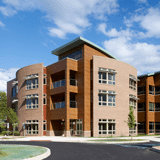PROJECT
Location Sellersville, PA
Size 30,000 ft²
Completed 2012
Program Continued care and adult daytime services
The Rockhill Mennonite Community shows its religious affiliation just by its name, but its new senior housing organization has another affiliation to the Earth that is not so easily apparent. “Part of our value is to be good stewards of the Earth,” says Ron Sawatsky, CEO of Rockhill. “This translates to us being good stewards of the way we run our operations.”
Espousing an ethos of peace and holistic care, the newly expanded, LEED-certified community evinces a smart sense of modernism; it defies simplistic notions of Mennonite life and reinforces the role of the community within the greater context of elder care throughout southeastern Pennsylvania. Originally established in 1935, Rockhill sits on 44 pristine acres in Bucks County, and the new three-story, 30,000-square-foot, 20-unit Personal Care and Adult Day Services Building addition brings Rockhill’s total coverage to include 217 independent living residences, 53 personal care residences, a 90-bed health-care center, and a 35-person adult daytime services program.
TEAM
Client Rockhill Mennonite Community
Architect SFCS Architects
General Contractor Wohlsen Construction
The campus is large, but it is all connected through a C-shaped formation with a landscaped internal courtyard. The new Personal Care Building is an extension of that formation, connected by a 45-degree angle to an assisted-living care structure built in 1998. Documentation for LEED certification on the expansion, with a target of LEED Silver, was submitted for review in Summer 2012.
LEED certification was only the next step in a long tradition of sustainable practices at Rockhill. In 2009, Rockhill partnered with an outside mental-wellness organization, Wellspring Clubhouse, to build a separate building on campus that uses geothermal systems. Additionally, the entire Rockhill campus participates in the EnerNOC program, which turns down the energy usage on hot days to lessen the impact on the power grid. It also implemented water-cooled air-conditioning that is powered by wells and domestic water sources.

Rockhill’s new Personal Care Building uses substantially less energy than a typical structure of its size thanks to geothermal heating and cooling.
GREEN
Certification LEED Silver
Site Built as addition to existing site infrastructure
Materials Brick and Trespa wood grain building exterior
Water Low-flow toilets and plumbing
Heating 44 geothermal wells harness natural energy
Energy Participation in EnerNOC energy-reduction program
Extending these practices to the Personal Care Building, Rockhill drilled 44 wells to provide the heating and cooling needs for the building, though there are electric radiators under the windows in case of a heating failure during the cold winter months. The building also includes significant natural lighting, low-flow toilets, low-energy fluorescent lighting, and foam insulation. Entrance overhangs include green roofs planted with succulents. “Because we have done so much with sustainable systems on our campus already, it was challenging to achieve high LEED scores for the new building,” Sawatsky says. “It was thus more realistic for us to have a goal of LEED Silver.”
As an extension of the project, Rockhill is also constructing a stand-alone, 450-square-foot chapel in the courtyard at the center of the C-shaped formation. “The chapel attends to the emotional, physical, social, and spiritual needs of our residents,” Sawatsky says. “It’s a place to meditate and spend time focusing on the spiritual and emotional aspects of what happens in our lives.”
Although Rockhill is an organization sponsored by the Mennonite church, its services are accessible to people of all backgrounds and denominations, which corresponds with the Mennonite mission emphasizing the principles of community, mutuality, and service. And insofar as Mennonitism promotes charity to extend toward the greater surrounding community, the faith community eschews the separatist principles championed by the Amish, who, once close relatives of them, are often confused with Mennonites.
The continuing care retirement services offered by Rockhill are an extension of the Mennonites’ deeply ingrained ethos of stewardship. “Stewardship of the gifts we have received from God is a key ingredient of what we do,” Sawatsky says. “We’re always working hard to practice this in everything we do. We believe we have a responsibility to care for the Earth and all who live on it.”


